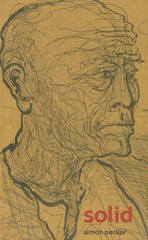“Stories of bullfighting and bullshit.”
 Simon Parker is a well-known figure in the Cornish Arts world: playwright, editor of both the Western Morning News‘s Living Cornwall supplement and the independent literary journal Scryfa. Scryfa has been around for more than a decade now and has recently begun to make use of its name and contacts to publish novels and collections of short-stories and poems; one of the most recent of these is the Holyer An Gof award nominated Solid, by Parker himself.
Simon Parker is a well-known figure in the Cornish Arts world: playwright, editor of both the Western Morning News‘s Living Cornwall supplement and the independent literary journal Scryfa. Scryfa has been around for more than a decade now and has recently begun to make use of its name and contacts to publish novels and collections of short-stories and poems; one of the most recent of these is the Holyer An Gof award nominated Solid, by Parker himself.
This novella (at just 50 pages barely distinguishable from a short-story) ostensibly tells the story of Edward Jose, a Cornishman who left home to become a matador at the beginning of the twentieth century. In fact, it is an experiment in narrative form from a very confident writer.
Edward Jose is Cornwall’s very own Baron Münchhausen: the novel begins as a young journalist arrives to interview an ageing matador (Jose) and Parker writes in a conventional variable third-person narrative style. Already, though, one senses that Parker is beginning to play with expectations since the narrator can shift from one paragraph to the next. In the second chapter, the storyteller adopts the rare second-person narrative voice and largely keeps this through the rest of the book (some passages, including the end, returning to the variable third). This narrative style works to make us imagine that we are the reporter envisaging himself as Jose whilst he tells his story – a Russian doll narrative structure. As if this literary conjuring trick were not enough to demonstrate the author’s confidence, however, a third element is introduced; Jose is an unreliable narrator.
The concept of restructuring events in ones life to make sense of them in hindsight is one familiar to oral historians and one which authors have been playing with for almost as long as they have been struggling with it. More than that though, Jose fled his life Cornwall after the tragedy and trauma of a mine collapse (which he was in) and built a new life for himself as a famous matador. In building that life, he created his own myth and in the intervening years the lines between that myth and fact have become blurred. [Spoilers follow in this paragraph]. So it is that we learn how he was buried alive for a fortnight; how his first wife lay in a coma for three months; that his second wife ate butterflies to make herself beautiful and expressed her pleasure during sex not vocally but through playing the castanets; that he was abducted by and became a bandito; that he joined the circus; that he was resurrected in a convent and slept with every nun and finally how he came to fight on both sides (and neither side) in the Great War.
A debt might be owed to magical realism (especially the butterflies) but ultimately what emerges is a very European yarn of the kind told in Atlantic sea-faring communities such as Cornwall by old men in exchange for a drink for as long as anyone can remember. In 1001 nights Scheherazade bids the sovereign to sleep between her tales, trusting that he’ll want to hear more when he wakes. Here, Jose sleeps. He naps between tales confident that his audience will still be around and longing to hear what he’ll spin next and where it might all be leading. Parker knows when his reader should be ushered to the door though and we’re left with the verse which inspired the near apocryphal title. Solid? Nothing about Jose’s tale is solid from the moment of his first “death” down the mine, but then what of Cornwall’s quixotic sense of self in the twentieth and twenty first centuries?









Good review, might i say. Nicely concise.
In my capacity as longtime dosser in Pedant’s Corner . . . . apropos of Münchausen, the curator at the Cornwall Centre/Kresenn Kernow (@Redruth) recently pointed out that they’ve got Baron von Münchausen’s adventures in store there (among a vast collection of other Cornwall-related material), because Rudolph Erich Raspe wrote some of this while he was working at Dolcoath in the 1780s. To get right back on topic, I think that store also has a copy of Solid, which sounds intriguing (cf Richard Jose/José, ex-Lanner … decanted with a little of Rio Tinto mines and Dalí perhaps). Not having read either yet, it’d be good to read Simon’s yarn and (perhaps just scan) Rudolph’s.
Thanks Peter. I’m not sure I had any idea about Raspe’s Cornish connection; another one to add to the ‘Cornish Inspired’ list!
[…] link to Scryfa, the publishers, is in the sidebar here): the Cornish Literature review can be found here. The winner of the overall literary prize (as I interpret the awards) as Jane Dark’s […]